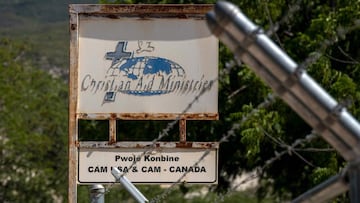Missionaries kidnapped in Haiti: what happened and when were they released?
All 17 North American hostages have now been released after two months held captive by Haitian gang 400 Mawozo near the capital of Port-au-Princes.


The Haitian national police have confirmed that all 17 members of a North American Christian missionary group kidnapped two months ago have now been released. Five had previously been released, but the remaining 12 were found in the outskirts of Port-au-Prince, Haiti’s capital.
Officials have not yet said whether any ransom was paid to secure their safe release but it is known that the United States government does not pay ransom fees, for fear of encouraging further kidnappings.
Read more
- Why is there a surge in kidnappings in Haiti?
- What is the salary of US border patrol agents?
- How did Haitians end up at the US border in Del Rio, Texas?
The hostages’ two months of captivity highlights the precarious situation in Haiti where criminal gangs have assumed power in the captial in the aftermath of the assassination of former President Jovenel Moise in July.
All 17 hostages have been set free in Haiti
In October the 400 Mawozo gang, which is thought to control the Ganthier commune, where the missionary workers were captured, took 17 people hostage – six men, six women and five children. The New York Times reports that the 12 recently released hostages will travel to Miami but the US Embassy in Haiti has so far declined to comment on the situation.
Those kidnapped were predominantly American, with one Canadian citizen amongst them. They were working for an Ohio-based organisation called Christian Aid Ministries which organises missionary trips.
"We glorify God for answered prayer—the remaining twelve hostages are FREE! Join us in praising God that all seventeen of our loved ones are now safe," Christian Aid Ministries wrote in a statement.
"Thank you for your fervent prayers throughout the past two months. We hope to provide more information as we are able."
The 12 remaining hostages kidnapped by a criminal gang in Haiti are now back on American soil. They're the last of a group of 17 missionaries who were captured two months ago. pic.twitter.com/QfSCOHBdR9
— CBS Evening News (@CBSEveningNews) December 18, 2021
What is the current situation in Haiti?
Back in April ten people were kidnapped in a commune called Croix-des-Bouquets, just to the north of Port-au-Prince. That group included four Catholic priests and two French citizens and is also thought to have been carried out by the 400 Mawozo gang.
In recent years the public safety situation in Haiti had been getting increasingly insecure with kidnappings and violent attacks becoming more common. Speaking to NBC News in October, Daniel Foote said: "The gangs run Port-au-Prince. It is in their control.”
The assassination of #Haiti's former President #JovenelMoise is still unsolved. A new report details he owned a sought-after list of drug traffickers. @nytimes' Maria @Abihabib tells @marclamonthill that Moïse was in business with some list members. #BlackNewsTonight pic.twitter.com/7vXRkT2m9s
— Black News Channel (@BNCNews) December 14, 2021
Related stories
Foote was formerly a US special envoy for Haiti but he resigned in protest to President Biden’s refusal to grant refugee status to Haitians travelling to the States on humanitarian grounds. In September some 28,000 Haitians gathered under a bridge in Del Rio, Texas in hope of escaping the increasingly dangerous situation in the capital.
The assassination of former President Moise left a void in the nation’s political and social structures and several violent gangs have moved in the fill the absence. Gangs essentially control many of the supply routes in and out of Port-au-Prince and have been able to hoard what depleted reserves of fuel, medical supplies and other resources are left in the capital.
